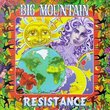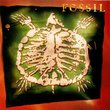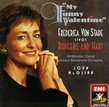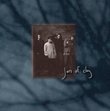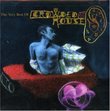| All Artists: Stravinsky, Rattle, Birmingham Symphony Title: Firebird Suite Members Wishing: 0 Total Copies: 0 Label: Capitol Release Date: 9/19/1989 Genre: Classical Styles: Ballets & Dances, Ballets, Historical Periods, Modern, 20th, & 21st Century Number of Discs: 1 SwapaCD Credits: 1 UPC: 077774917827 |
Search - Stravinsky, Rattle, Birmingham Symphony :: Firebird Suite
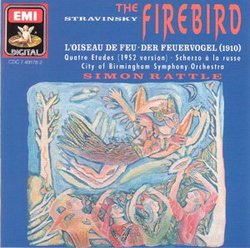 | Stravinsky, Rattle, Birmingham Symphony Firebird Suite Genre: Classical
|
Larger Image |
CD DetailsSimilarly Requested CDs
|
CD ReviewsA Real WOW! Doug - Haydn Fan | California | 01/15/2009 (5 out of 5 stars) "Thanks to Santa Fe's tip I tried this and can only wholeheartedly agree with his high opinion. The orchestra players give about as good as they can, and few major groups achieve such intensity or play with such care and concentration. Much of this has to be credited to Rattle's leadership: one could easily imagine his agent rushing out copies of this performance to various organizations - no doubt the Berlin got one!
Stravinsky's Firebird music comes in several packages. You have the earliest ballet music, a suite derived from this, yet another suite, and a much later revised version written at the end of World War II. The earliest music can be played two ways. You can go for a Romantic, lyrical approach, still beholden in many passages to Rimsky-Korsakov, downplaying the frentic and strident elements, and playing up the pretty elements of the music's narrative. This usually comes out best in the earliest shorter, somewhat more tightly constructed suites, and Monteux plays the music in this fashion as well as anyone. (And he was in the pit for the premieres of the next two Stravinsky ballets, so there is always going to be some degree of historical legitimacy to his readings.) However, life moves on, and modern orchestras and the better conductors tend to opt for the fuller ballet score when given a choice. This approach means you can go at the score all out, pushing the sound out and giving up some of the story's melodic line for sheer coloristic and rhythmic excitement. This tends to wrok best if you chose the much longer, more episodic full ballet music. Rattle and the Birmingham orchestra largely goes the second path - and do so with passion and brilliance. Perhaps the most remarkable achievement is that Rattles' musicians play their parts with such beautiful tone. This is most marked in duets and trios and groups, where only tremendous preparation and conducting could achieve this level of performance. (Only here and there in solo passages does one notice the players are not first chairs for a top orchestra.) Listening to this version I was also struck by how informed this performance is by not only such works as the composer's symphonic music, but later Stravinsky - the complexity and intensity of Rattle's conducting has a modernity at times more in common with the powerfully internalized colors and dense rhythms of the American abstrationist Stefan Wolpe than the music of the young Russian composer of 1909 who first wrote ballet music for Diaghilev. The other shorter works are played with equal skills and fervor. The EMI engineers did an impressive job, too. All and all a huge success! If someone suggested this was a 'legendary' recording they would not find any argument from me." |

 Track Listings (13) - Disc #1
Track Listings (13) - Disc #1![Harry Potter and the Prisoner of Azkaban [Original Motion Picture Soundtrack]](https://nationalbookswap.com/cd//m/28/9428/689428.jpg)

